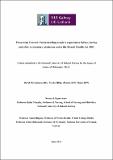| dc.contributor.advisor | Murphy, Kathy | |
| dc.contributor.author | McGuinness, David | |
| dc.date.accessioned | 2016-11-21T09:18:51Z | |
| dc.date.available | 2016-11-21T09:18:51Z | |
| dc.date.issued | 2016-06-08 | |
| dc.identifier.uri | http://hdl.handle.net/10379/6165 | |
| dc.description.abstract | Aim: To generate a grounded theory to understand people’s experiences before, during and after involuntary admission and/or detention.
Background: The MHA (2001) provides a legal framework for the involuntary admission and treatment of people against their will. There is little research on people’s experiences throughout the trajectory.
Methods: In-depth, semi-structured interviews were conducted with fifty people across three hospitals approximately three months after discharge. Interviews were analysed using constant comparative analysis, theoretical sampling and memo writing according to the Straussian Grounded Theory (Corbin & Strauss, 2008).
Findings: The core category was ‘Preserving Control, which consists of three related categories: ‘Losing Control’, ‘Regaining Control’ and ‘Maintaining Control’.
‘Losing Control’ describes the extent to which participants experienced a reduction in their autonomy and liberty owing to: (i) difficulties in regulating feelings and emotions; (ii) the involvement of professionals and or families and; (iii) the feelings of restrictiveness and coercion associated with being in hospital.
‘Regaining Control’ describes the way(s) that autonomy and liberty was restored to participants through: (i) fighting back against the system (ii) positive relationships with professionals; (ii) cognitively appraising what was happening to them or; (iii) conforming to the system.
‘Maintaining Control´ describes how participants were impacted personally and socially on discharge. Participants attempted to move on by: (i) preventing families and society from viewing them as ‘mentally ill’ or; (ii) by protecting their mental wellbeing.
Conclusion: The less extensive the loss of control, the more positive the experience was and the easier it was to regain and maintain control. Control may be optimised through more personal interactions and the provision of information and an explanation. | en_IE |
| dc.rights | Attribution-NonCommercial-NoDerivs 3.0 Ireland | |
| dc.rights.uri | https://creativecommons.org/licenses/by-nc-nd/3.0/ie/ | |
| dc.subject | involuntary admission | en_IE |
| dc.subject | Mental Health Act | en_IE |
| dc.subject | Nursing and Midwifery | en_IE |
| dc.subject | Involuntary admission | en_IE |
| dc.subject | Detention | en_IE |
| dc.subject | Experiences | en_IE |
| dc.subject | Control | en_IE |
| dc.title | Preserving control: understanding people's experiences before, during and after involuntary admission under the Mental Health Act 2001 | en_IE |
| dc.type | Thesis | en_IE |
| dc.contributor.funder | Mental Health Commission | en_IE |
| dc.local.note | Fifty service users were interviewed about their experiences of being involuntarily admitted to psychiatric, across three hospitals. The findings revealed the theme of Preserving Control. All services users described striving for control. When health professionals supported service user ‘sense of control’ then their experience was more positive | en_IE |
| dc.local.final | Yes | en_IE |
| nui.item.downloads | 1154 | |


